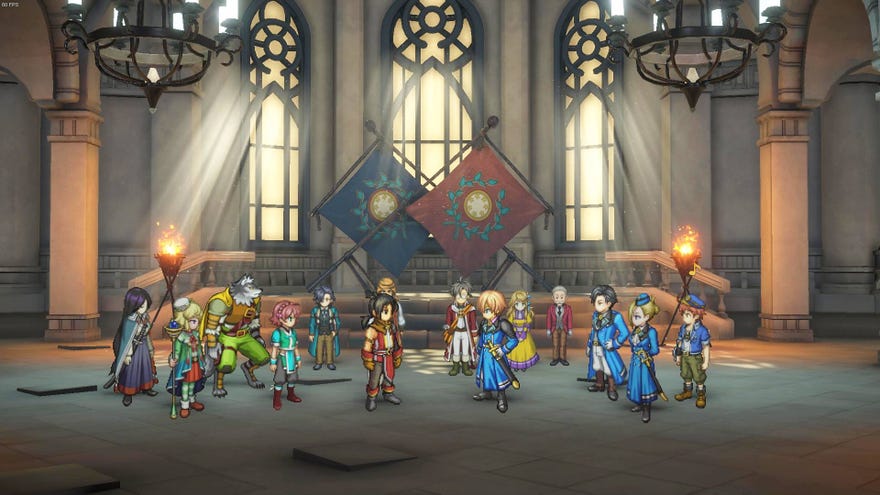Eiyuden Chronicle: Hundred Heroes review: a relaxed JRPG adventure with a few old school quirks, but even more pals
And the love Kickstarts again
Eiyuden Chronicle: Hundred Heroes is the spiritual successor to a classic JRPG called Suikoden, and it came to be thanks to a very successful Kickstarter campaign. As someone with little knowledge of Suikoden, I went into Hundred Heroes thinking it was going to be a dense, old-fashioned, and slightly impenetrable time. And yes, some of it is annoying and obtuse and will almost certainly suit veterans who enjoy those quirks, but it has a surprisingly easy going nature. Hundred Heroes accomodates new players like me with combat that's simple to grasp and a story that's emotional and sprawling and absolutely worth your time.
If you've not played Suikoden, or Hundred Heroes' prequel Eiyuden Chronicle: Rising, there's no need to worry. The game's story stands on its own as a sprawling continent-wide war that's not only welcoming to newcomers, but told in a way that's manageable for folks like me who struggle to keep up with who's fighting who and for what.
There's this land called Allraan, right. And there's these folks called the Galdean Empire led by a conniving king called Dux Alric. He's not very nice. Why? Because Allraan is home to these things called Rune Lenses (powerful magic things) and he wants to harness their power for evil. You play as Nowa, a member of a band of generous mercs. Nowa gets caught up in Dux Alric's evil plans and decides - a pushy leader who almost certainly has a crush on Nowa gets involved, as well - to put a stop to it. To dismantle Alric's plans, Nowa must travel around Allraan amassing an army of powerful heroes. One-hundred-and-something, to be semi-precise (the game's title, despite sounding definitive, is inaccurate).
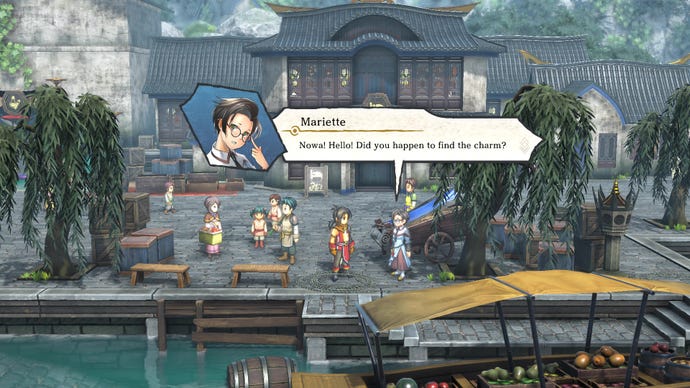
I don't want to spoil the story, but I will make the spoiler-free observation that Nowa's journey folds into two others: an Empire lad called Seign, and a forest dweller called Marisa. While it might sound overwhelming, it's all delivered by way of smaller, more personal stories that help you understand the bigger picture. For instance, you learn more about the origins of the Rune Lenses not from a lengthy spiel, but from an actual switch in perspective and a hands-on quest that carefully complicates matters without ever straying into tangle territory.
The main story is what steers you to new places with quest markers, so you've forever got somewhere to travel. For the most part, exploration sees you progress through regions of Allraan, where you'll bounce between bustling towns filled with Chinese-inspired architecture, cutesy ice villages, and Shi'arc infested desert oases. Like say, the original Final Fantasy 7, these places exist as blocky bits on a condensed 3D map, which you'll run between as titan-sized Nowa avatar to give off the impression you're covering great distances.
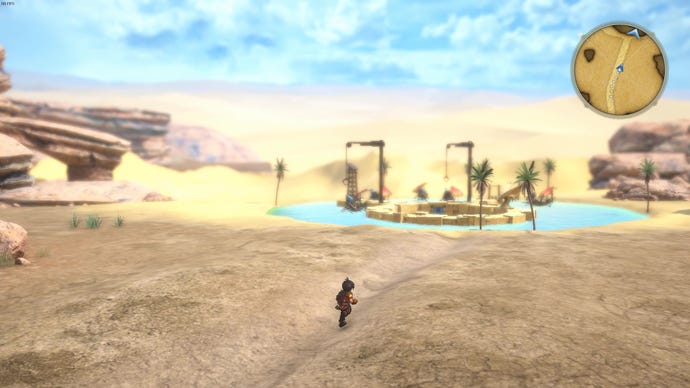
A pattern does establish itself fairly quickly, in the sense that you'll visit some towns, get involved in that region's story, then inevitably find yourself travelling to a dungeon. Here you either navigate some corridors to get from A to B, or you navigate some corridors with bonus puzzling. Hooray!
Early on there are a lot of forest paths that lie between you and mystery things, and these are largely fine, with some chests to crack open and resources to harvest. Some dungeons, where you've got to activate glyphs to rotate paths, or find keys to open coloured doors, can grate a bit, though. I found their combination of empty corridors and traditionalist puzzles a little tedious, made all the more frustrating when my to-and-froing was interrupted by constant random encounters.
It's to be expected, right? Eiyuden is old school: you've got to save at specific points (there's an autosave feature, although it's infrequent enough to make me distrustful); you're forever dragged into fights wherever you go. JRPG stalwarts won't mind these things, and will no doubt enjoy scraps that crash onto your screen like YouTube ads. I've grown used to them, but I wish there was a speed up button to whizz through the simpler tasks during travel.
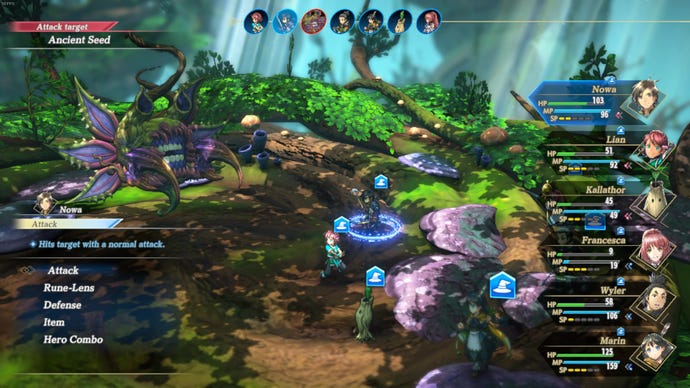
Fights themselves are turn-based, with a bar filled with both friendly and enemy portraits letting you know who's next. At the start of your turn, you cycle through your party of six and select each of their moves one by one. Click "finish" and combat commences, with everyone doing their thing; rinse and repeat. It's clear and easy to grasp, with added strategy in how you position your party members. Three members go at the front, while three go behind them (one extra exists as a support buff that doesn't fight), so it's crucial you pop burly lads at the front, for example, while squishier rangers or spellcasters can do their thing from a relatively safe distance.
Once I set up my party, though, I opt for the "auto" button - which just lets everyone do their own thing - for 90% of the fights. Even including some bosses. Honestly, I respect the auto function's power in making it easier for the story-oriented player who want to crack on with minimal fuss, but I've found its potency exposes the combat's limitations.
Communication is what it comes down to, I think. Aside from when your heroes take their turns, you can't tell who the enemy is going to target and with what. Your options are to spam the same few moves over and over, occasionally waiting for your SP bar to fill up so you can perform a fancy Rune Lense-powered move. Sometimes your characters leap to take hits aimed at someone else, seemingly of their own accord. Sometimes they'll stun enemies, seemingly out of nowhere. Effects and the like aren't communicated enough either, if at all (most are buried in an in-game menu), so even without the auto system fights take on an auto-battler feel: a double shot of attrition with a dash of randomness.
There's also no system where you exploit enemy weaknesses to build up extra turns like Shin Megami Tensei 5, or in-depth buildcrafting to offset some turn-based fatigue like Final Fantasy 8's Junction system. Instead, Hundred Heroes' equivalent is hero combos, where certain matey party members can perform super duper moves, like Nowa and the plucky Lian who can expend 2SP each to rinse enemies with a slash and a punch. They are wonderfully animated and seeing large numbers pop up is great, but man, it doesn't add any other dimension to combat besides, "I guess I'll wait a bit so I can use it again".
The difference with Boss battles is that they often have "Gimmicks" that take better advantage of your turns. One fight against a huge crab has you expend turns to hit its legs, toppling it and exposing its pale belly for a round of more powerful smacks. Others have you wrestle over a lever that causes an enormous boulder to crash onto whoever it looms over at the end of the turn. A handful make for the most memorable fights in the game by placing more weight on your actions.
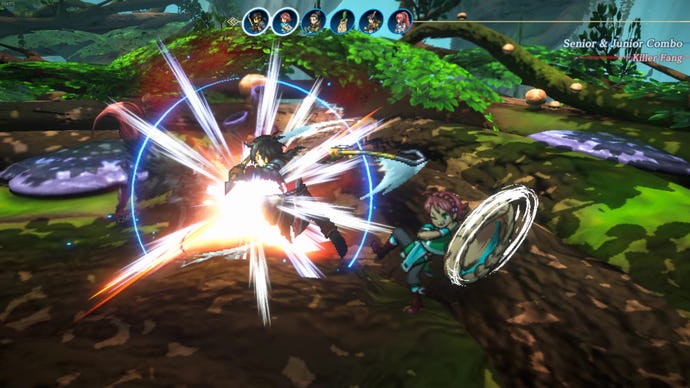
Combat is switched up a bit by changing your roster. On your journey across Allraan you'll recruit lots of pals, mainly by exploring areas until you bump into a more colourful character model than everyone else around, a bit like when you spot a cosplayer getting off the tube. Some don't take much persuading, while others demand you fight them, or fetch them things. It's endlessly exciting when you add someone new and rejig your optimal setup. For instance, I have a particular fondness for a beer-bellied guy who calls me "COUSIN!!" and hurls cannonballs. A shinobi who hurls shurikens is my ranged go-to, as she's able to evade attacks like no-ones business. And I've levelled one healer from the start who's capable of raging, which turns her from a healbot to a certified Tyson Fury.
But while having lots and lots of heroes means great variety in who does 90% of your auto-battling, it's a bit of a shame that variety can only be injected at inns or save points (at save points if you've got a special seventh support character equipped), where swapping mid-combat - even from a small pool, as opposed to everyone - might've made adaptation more interesting. Often you commit to a setup, then regret your decision, or you commit to a setup and stick to it, because some heroes are clearly better than others. I will say that the game handles levelling your heroes well, as underleveled folks get tons more EXP until they've caught up, so new heroes aren't immediately written off.
Climactic story moments are often determined by a different sort of turn-based battle that also encompasses your heroes, albeit in a way that's not all that clear. Things go a bit Fire Emblem in War, a mode set on a grid where you try and anticipate your opponent's moves by positioning your leader chips in advantageous spots. Once the turn begins, the camera zooms in on an automated battle where you see dinky troops swipe halberds and tussle with fireballs. It's unclear, because despite being able to switch battalion leaders to confer benefits to your soldiers, there's very little info on how your various other heroes truly contribute to the fight as it's happening. I find I just kind of move some pieces and the battle resolves itself, or it goes a certain way because the story predetermined it.
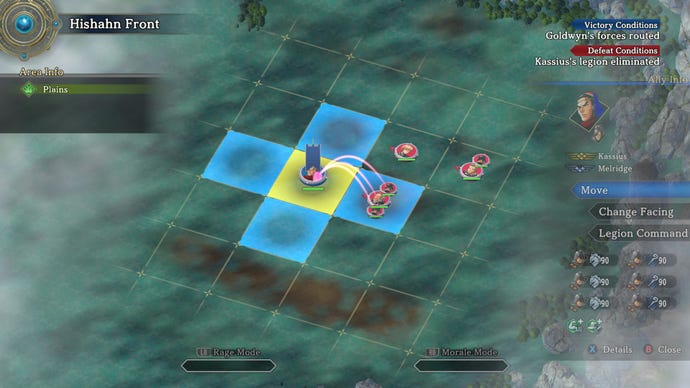
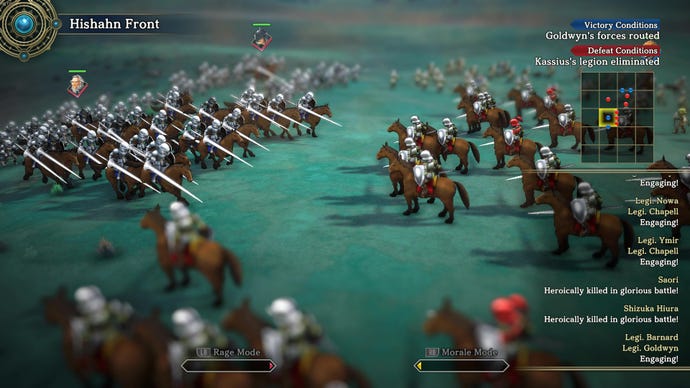
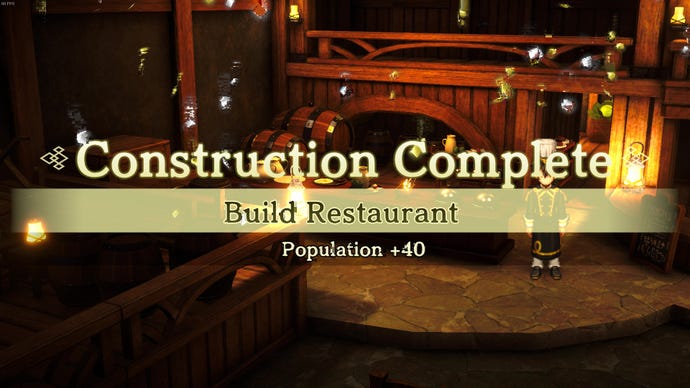
As someone who's not the biggest strategy head, so I appreciate the game's relaxed nature in letting me press a button, watch the action unfold, and, from time to time, take the reins. But, as with the turn-based combat, some folks who like pure, total control over the stats may rue its relative simplicity.
Off the battlefield, Heroes find a home in your Castle, which exists as a centerpoint for your army, and a settlement you invest in over the course of the game. It's an enormous thing, a bit like Yakuza's Dondoko Island, that could have its separate mini-review. But I will say that it's a lovely place to see your pals get together, an easy way to harvest resources more reliably later on, home to fun minigames (cooking, racing, Beyblade) and its development acts as an embodiment of your progress.
Eiyuden Chronicle: Hundred Heroes has some old school habits, and they can be difficult to live with at first, but once you settle into those quirks, it's a story you'll struggle to put down. The sense of journey is magnificent, as you march across snowy valleys, lush jungles, and dusty deserts, sweeping up buds along the way. And you regularly partake in moments that'll genuinely surprise, forever keeping your quest from getting stale. Expect one-on-one fights, cinematic song, and races of some description. If you're a fan of Suikoden, it's a no-brainer. And if you're a fan of JRPGs or struggle a bit with old-fashioned things, I'd still urge you to give it a shot. It's a really lovely hang.
This review was based on a review build of the game provided by the developers.
